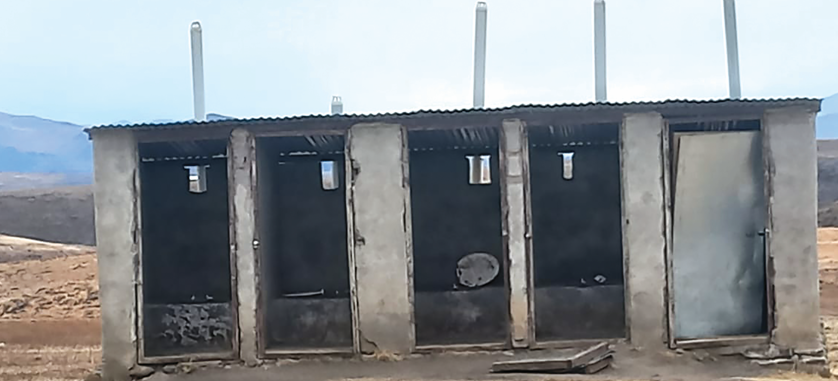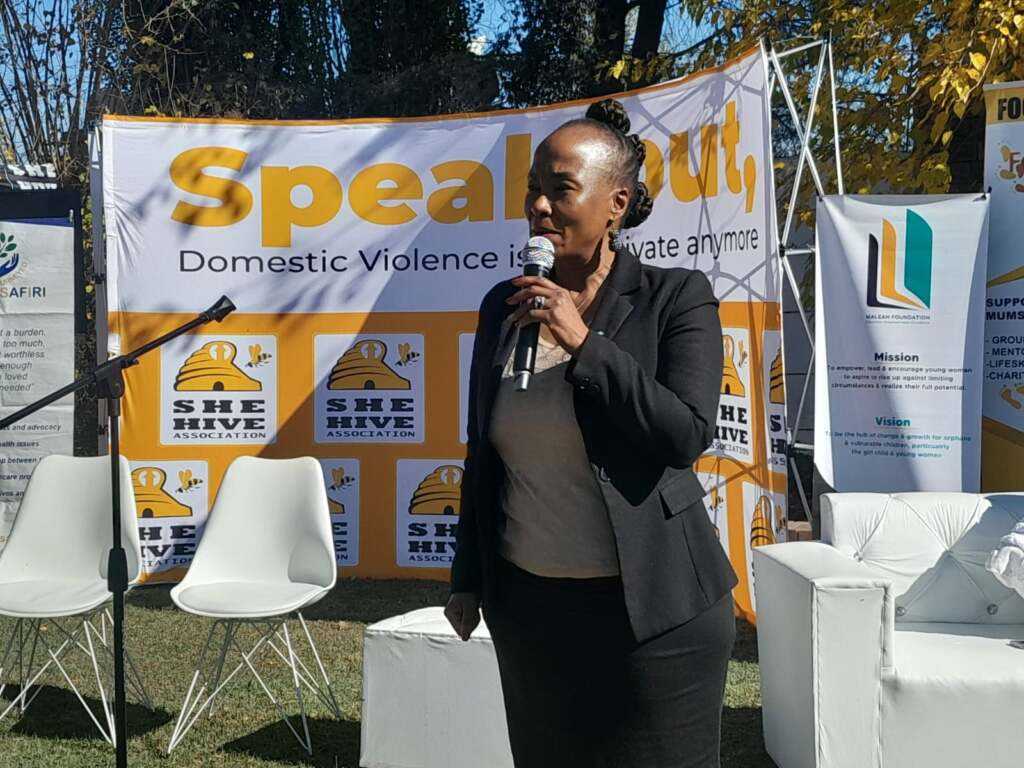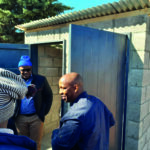Ntsoaki Motaung
For many women, privacy is a fundamental concern during their menstruation period, a time when dignity, cleanliness, and comfort are essential.
However, for the girls at Mohlanapeng High School in Thaba Tseka, privacy is a luxury they simply do not have. With inadequate facilities and a serious lack of proper sanitation, the school’s female students face daily challenges, particularly during their menstrual cycles.
The situation at Mohlanapeng High School is alarming.
The school only has five toilets for all the female students, and they are far from suitable. The toilets lack doors, offering no privacy as they are placed in plain view of anyone passing by.
Boys, on the other hand, have no toilets at all and are forced to walk to the nearest valley to relieve themselves when nature calls.
‘Maneo Chobokoane, a teacher who has been at the school for nearly 15 years, said this issue has persisted since she first arrived in 2010.
“The lack of doors on the girls’ toilets has been a constant problem. This is not just about privacy, it is about their health too,” Chobokoane explained.
“Since I have been here, I have never seen those toilets being washed. There is no water at the school, and that makes it impossible to maintain basic hygiene,” she added.
For girls, menstruation is a particularly sensitive time, requiring proper hygiene practices that are impossible to maintain without water. Without the ability to wash their hands or properly clean themselves, these young women are left in a vulnerable and uncomfortable position.
“We all know that the menstruation period is the sensitive time where every woman has to practice good hygiene, but learners here are compelled not to wash their hands because there is no water,” Chobokoane emphasised.
But the situation for the boys is even direr.
Leluma Nkuebe, another teacher at Mohlanapeng, explained that the boys do not even have access to a single toilet.
“They have to go to the nearest bush or valley when they need to relieve themselves. Sometimes they are gone for more than 15 minutes, and that disrupts their learning because the class continues without them,” Nkuebe said.
Molikuoa Sekhonyana, the Chief Information Officer for the Ministry of Education and Training, told Newsday this week that it is the responsibility of schools, especially high schools where students pay fees, to maintain and repair pit latrines.
However, Sekhonyana added that the ministry sometimes steps in to assist when schools face significant challenges, taking factors such as student enrollment into account.
The conditions at Mohlanapeng High School fly in the face of Lesotho’s National Guidelines for Water, Sanitation, and Hygiene (WASH) in Schools.
According to these guidelines, all learners have the right to quality education, which includes access to clean drinking water, sanitation, and hygiene services while at school.
Yet, the reality is that more than 50 percent of schools in Lesotho still lack access to basic WASH services.
The guidelines further stress that “safe sanitation, drinking water, and hand hygiene practices are among the most powerful ways to protect learners’ health.”
Proper toilet facilities, with separate cubicles for boys and girls, doors for privacy, and a clean environment, are critical to ensuring the safety and comfort of students, especially in the wake of the COVID-19 pandemic, which highlighted the importance of hygiene in disease prevention.
The situation at Mohlanapeng High School not only violates these guidelines but also places the students, particularly the girls, in compromising positions daily.
The conditions at the school also breach several international human rights conventions, including the United Nations Convention on the Rights of the Child (CRC) and the Convention on the Elimination of All Forms of Discrimination Against Women (CEDAW).
According to the CRC, every child has the right to a standard of living adequate for their physical, mental, and social development, which includes access to basic sanitation and hygiene.
The CRC emphasises the importance of providing children with an environment that allows them to thrive, and inadequate sanitation directly undermines this right.
The Universal Declaration of Human Rights (UDHR), under Article 25, guarantees everyone the right to an adequate standard of living, including health and well-being, which encompasses access to clean water and sanitation. Failing to provide these services violates the girls’ rights to health, dignity, and safety.
The CEDAW, to which Lesotho is a party, calls for the elimination of all forms of discrimination against women and girls, including the provision of adequate sanitation facilities to ensure their right to privacy and health.
Lack of proper toilet facilities and the inability to maintain menstrual hygiene is a form of systemic discrimination that directly affects the girls’ ability to participate in education on an equal footing with boys.
Without urgent intervention to improve the school’s WASH system, the privacy, health, and dignity of these learners will continue to be undermined.
According to the UNICEF-WASH guidelines, proper sanitation facilities are essential for ensuring that students, particularly girls, remain in school during their menstruation periods.
Without safe, clean, and private toilets, girls are often forced to stay home during their periods, which impacts their academic performance and, in the long term, their future opportunities.
The Sustainable Development Goals (SDGs), particularly Goal 6, call for clean water and sanitation for all by 2030. Lesotho, as a signatory to these global goals, must prioritise the improvement of WASH services in schools to meet its commitments and safeguard the fundamental rights of its children.
Summary
- Proper toilet facilities, with separate cubicles for boys and girls, doors for privacy, and a clean environment, are critical to ensuring the safety and comfort of students, especially in the wake of the COVID-19 pandemic, which highlighted the importance of hygiene in disease prevention.
- The conditions at the school also breach several international human rights conventions, including the United Nations Convention on the Rights of the Child (CRC) and the Convention on the Elimination of All Forms of Discrimination Against Women (CEDAW).
- According to the CRC, every child has the right to a standard of living adequate for their physical, mental, and social development, which includes access to basic sanitation and hygiene.

Your Trusted Source for News and Insights in Lesotho!
At Newsday Media, we are passionate about delivering accurate, timely, and engaging news and multimedia content to our diverse audience. Founded with the vision of revolutionizing the media landscape in Lesotho, we have grown into a leading hybrid media company that blends traditional journalism with innovative digital platforms.










